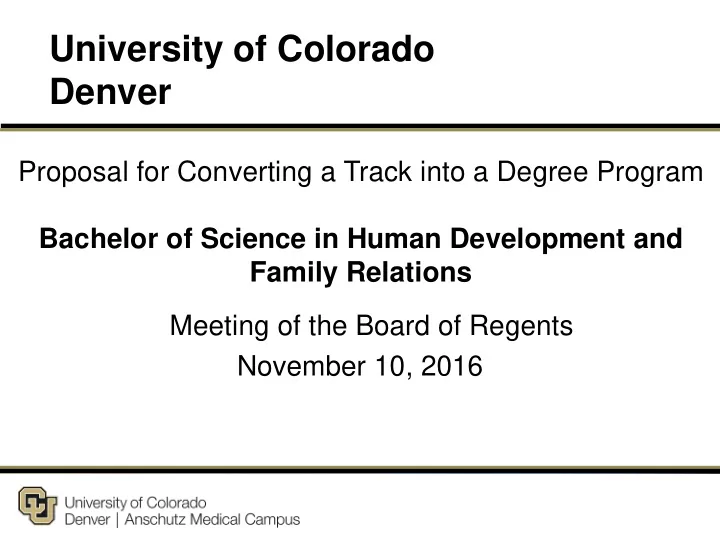

University of Colorado Denver Proposal for Converting a Track into a Degree Program Bachelor of Science in Human Development and Family Relations Meeting of the Board of Regents November 10, 2016
Overview of BS in Human Development and Family Relations (HDFR) Program • Currently a popular track in the BA in Education and Human Development (EDHD) program • Creating a separate degree will increase its visibility and enrollment • Currently students must undertake the core classes of the EDHD major, prohibiting them from taking all HDFR- related courses • Requires no new tenure track faculty • BS is the most commonly used degree by HDFR programs nationally
What is Human Development and Family Relations? • Vocational degree that prepares students for careers and leadership roles in working with diverse individuals, children, families and communities • Learning objectives are grounded in the family sciences
Further Discussion: • Workforce Demand • Student Demand • Enrollment • Duplication • Budget
Workforce Demand • The National Council for Family Relations has identified 11 major employment settings for HDFR majors (including Business, Consumer & Family Resources Services; Community-Based Social Services; Early Childhood Education; Education; Faith-Based Organizations; Family Services; Government & Public Policy; Health Care & Family Wellness; and International Education & Development) and many employment opportunities within each setting. • According to the Bureau of Labor Statistics, employment in community and social service occupations is projected to grow 10 % from 2014 to 2024, faster than the average for all occupations, adding about 257,700 jobs. Most new jobs in this occupational group will be in the healthcare and social assistance industry.”
Student Demand • HDFR is very popular regionally (e.g CSU, Utah) and nationally (including Cornell, the University of Connecticut, Michigan State University, Vanderbilt, Pennsylvania State University, The Ohio State University, and many more ) • CSU has 1,100 students enrolled in its HDFR major • The CU Denver EDHD began in Fall 2014 and 30-35 new students each year enroll in the HDFR track
Duplication • While there are numerous HDFR undergraduate degree programs nationally, the only institution in Colorado to offer a degree in HDFR is Colorado State University. • It is not currently offered by CU Boulder or UCCS.
Enrollment 2018-19 Year 2017-18 2019-20 2020-21 2021-22 113 Headcount 93 133 146 161 15 Graduates 13 23 19 30 Enrollment projections are modeled after the first two and a half years of enrollment in the HDFR track within the EDHD BA. Based upon current student residency patterns in the HDFR track in the EDHD BA, the vast majority of students will be Colorado residents.
Budget Details • The HDFR program does not require any significant start up costs and the School of Education portion of the instructional activity will operate within current resources as a result of a reallocation of faculty from the masters programs. • Based on anticipated enrollment growth, additional adjunct faculty in the College of Liberal Arts and Sciences will be required to teach 4 additional sections of the CU Denver core beginning in FY19-20. • No new tenure track faculty will be required. • Prior to any increases in adjunct faculty expenses in FY 2019-20, program enrollments will be reviewed to assess the need for additional course sections.
Year 1 Year 2 Year 3 Year 4 Year 5 Full 2017-18 2018-19 2019-20 2020-21 2021-22 Implementation Program Year Projected Revenues Cash Revenue: Tuition $724,220 $853,298 $943,874 $1,061,548 $1,136,738 $1,160,602 Cash Revenue: Fees $24,133 $29,290 $34,526 $38,173 $41,748 $42,758 Other Revenue $0 $0 $0 $0 $0 $0 Federal Grants/Donation $0 $0 $0 $0 $0 $0 Other Fund Sources $0 $0 $0 $0 $0 $0 Institutional Reallocation $0 $0 $0 $0 $0 $0 Total Program Revenue $748,353 $882,588 $978,400 $1,099,721 $1,178,486 $1,203,360 Projected Expenses Faculty $235,889 $235,889 $255,889 $255,889 $255,889 $255,889 Financial Aid specific to program $0 $0 $0 $0 $0 $0 Instructional Materials $0 $0 $0 $0 $0 $0 Program Administration $7,110 $7,110 $7,110 $7,110 $7,110 $7,110 Net of Campus Overhead (GAR) $260,719 $307,187 $339,795 $382,157 $409,226 $417,817 Rent/Lease $0 $0 $0 $0 $0 $0 Other Operating (TAs) $42,733 $47,890 $53,126 $56,773 $60,348 $60,348 Total Operating Expenses $546,451 $598,076 $655,920 $701,930 $732,573 $741,164 Program Start-Up Expenses Capital Construction $0 $0 $0 $0 $0 $0 Equipment Acquisitions $0 $0 $0 $0 $0 $0 Library Acquisitions $0 $0 $0 $0 $0 $0 Marketing $0 $0 $0 $0 $0 $0 Program Development $0 $0 $0 $0 $0 $0 Total Program Expenses $546,451 $598,076 $655,920 $701,930 $732,573 $741,164 Net Operating Balance $201,902 $284,512 $322,480 $397,792 $445,913 $462,196
Budget Summary • Gross tuition revenue is estimated at $724,220 in year one, increasing to over $1,160,602 million at full implementation • The program is expected to generate a positive annual balance in all years and approximately $462,197 at full implementation.
Conclusion • The program currently exists as a track in the BA in Education and Human Development • Creating a separate degree should make it more visible and popular • Most HDFR programs award a BS and not a BA • Can be implemented with minimal additional costs and without new tenure track faculty • Strong workforce and student demand
Recommend
More recommend